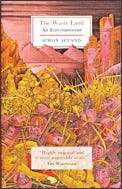A witty grail quest thriller with a difference, The Waste Land offers a story within a story: a satire on academic life frames the action-packed coming-of-age tale of a French knight who joins the First Crusade in 1095.
Venerable St Lazarus’ College is nearly bankrupt. A research assistant proves saviour when he discovers a medieval manuscript hidden in the library: the chronicle of young crusader Hugh de Verdon. The apparent inspiration for Chrétien de Troyes’ grail romance, Perceval, this intriguing journal can serve a similar purpose once again, as plotline for an alumnus author’s next bestseller. A share of the royalties will fill the College’s empty coffers nicely.
Former novice monk turned knight, Hugh eagerly accompanies his kinsman Lord Godfrey de Bouillon on his expedition to the Holy Land. An innocent abroad, he must grow up quickly to survive the horrors of a brutal campaign in which it's hard to tell friend from foe. His battles on the road to Jerusalem are as much with disillusionment and loss of faith as with the Saracens. Amid the holy carnage, Hugh begins a search for the mysterious, long-lost Lazarus Gospel. His quest unfolds, annotated with tart commentary by the College’s coterie of jealous professors, whose devious back-stabbing and murderous antics as they jockey for advantage echo those displayed by the Crusade’s vainglorious commanders.
Hidden in the guise of stirring adventure is a clever play on the paradox of duality. Hugh is a man of both peace and war, intellect and action, and his quest is a metaphor for the psychological and spiritual journey of the individual. The Crusade's bloody slaughter in the name of the Prince of Peace and its bitchily squabbling Greek chorus of academics together form a tragicomedy with links closer than we realize: in the past lies the present. The Waste Land is legendary entertainment indeed.
(2010; 374 pages, including a Dramatis Personae list and a bibliography)



